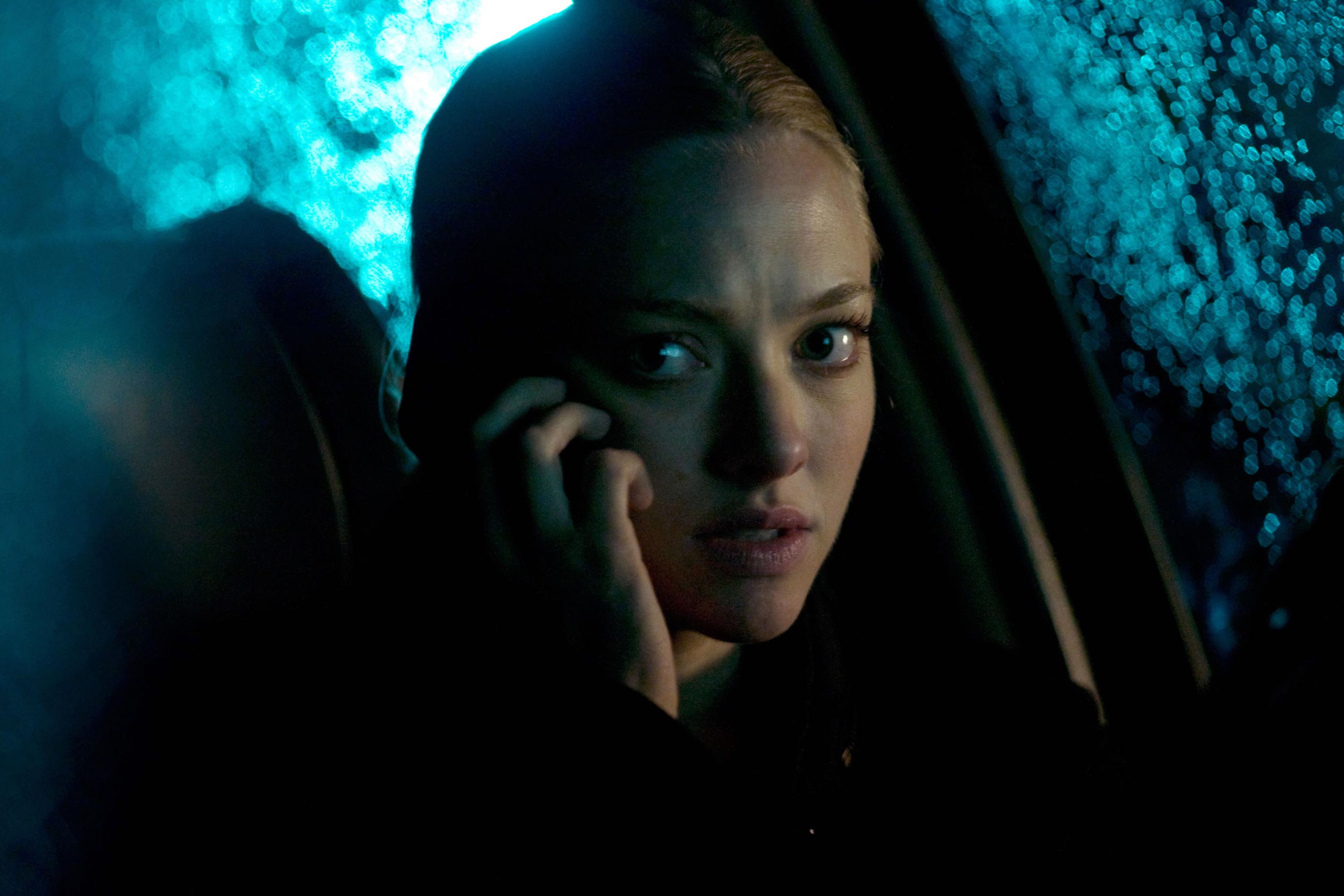Gone Review
Even when playing second fiddle to Lindsay Lohan and Rachel McAdams in teen comedy classic
Mean Girls and acting opposite three-time Oscar winner Meryl Streep in the musical
Mamma Mia!, Amanda Seyfried tackles all of her roles with grace, composure, and a powerful display of talent. With all she’s worth, however, Seyfried has the lesser Nicholas Sparks film
Dear John, the bland romantic comedy
Letters to Juliet, and Catherine Hardwicke’s (
Twilight) faux-Gothic
Red Riding Hood in her less-than-terrific repertoire of leading roles. Her latest film,
Gone, now settles into this list as perhaps the gravest offender.
This time around, Seyfried tackles the role of abduction survivor Jill. It’s been months since she was rescued, but she still hasn’t fully recovered from the traumatic event, so she’s living with her sister Molly (Emily Wickersham). Upon returning home from work one night, Jill notices that her sister is missing, but she knows that Molly wouldn’t leave without writing a note or notifying her about it in some other way.

Since being rescued, she has suspected that her attacker was responsible for other abductions, whereas the police have determined that Jill was mentally unstable. In a matter of minutes, she comes to the conclusion that her abductor came back for her but mistakenly kidnapped her sister. Going to the police doesn’t help at all, however, because she’s come to them time and time again about other kidnapped women and done so to no avail. With no one truly having her back, Jill sets out on her own to find her sister.
This sounds like a movie we’ve all seen before, doesn’t it?
Gone is an all-too-familiar retread of the many “I’m not crazy” crime-lite narratives that pop up far more often than we ask for them. Seyfried tries to imbue this bland and forgettable protagonist with some kind of depth as she tracks down an antagonist that may or may not exist – if his existence is even a question – against the wishes of the law enforcement that thinks she’s out of her mind. Some folks from Lifetime called — they want their Movie of the Week back.

We don’t have any real concern for Jill because the screenplay from Allison Burnett lacks the nuance, subtlety and development necessary to make us feel for her plight, regardless of how truly noble it is. The directing from Heitor Dhalia does no favors either, as the speedy pace he sets strips away all notions of tension or suspense. In only a few isolated moments does
Gone genuinely put you on the edge of your seat.
With her expressive face and ability to weave in and out of the most absurd scenarios with the utmost of ease, Seyfried capably carries this heavy burden on her shoulders. Sebastian Stan, who you might remember as Steve Rogers’ best friend Bucky in
Captain America: The First Avenger, naturally fits into his small role as Molly’s boyfriend. Unfortunately, the other portrayals in the film don’t deserve such accolades. Jennifer Carpenter of TV’s
Dexter and Daniel Sunjata offer us only one-note performances as the noncompliant police officers, while Wes Bentley’s work as an officer willing to help Jill under the radar feels overly embellished and utterly misguided.
The only aspect of the film that works to bring this mess together into something even remotely cohesive is Seyfried’s always captivating work. Even so,
Gone tells a snooze-worthy linear story that we can probably recite in our sleep. With the leading role in the upcoming Linda Lovelace biopic
Lovelace and a part in Tom Hooper’s
Les Misérables, let’s cross our fingers that Hollywood finally realizes Seyfried’s potential, and here’s to hoping she realizes it, too.
 Since being rescued, she has suspected that her attacker was responsible for other abductions, whereas the police have determined that Jill was mentally unstable. In a matter of minutes, she comes to the conclusion that her abductor came back for her but mistakenly kidnapped her sister. Going to the police doesn’t help at all, however, because she’s come to them time and time again about other kidnapped women and done so to no avail. With no one truly having her back, Jill sets out on her own to find her sister.
This sounds like a movie we’ve all seen before, doesn’t it? Gone is an all-too-familiar retread of the many “I’m not crazy” crime-lite narratives that pop up far more often than we ask for them. Seyfried tries to imbue this bland and forgettable protagonist with some kind of depth as she tracks down an antagonist that may or may not exist – if his existence is even a question – against the wishes of the law enforcement that thinks she’s out of her mind. Some folks from Lifetime called — they want their Movie of the Week back.
Since being rescued, she has suspected that her attacker was responsible for other abductions, whereas the police have determined that Jill was mentally unstable. In a matter of minutes, she comes to the conclusion that her abductor came back for her but mistakenly kidnapped her sister. Going to the police doesn’t help at all, however, because she’s come to them time and time again about other kidnapped women and done so to no avail. With no one truly having her back, Jill sets out on her own to find her sister.
This sounds like a movie we’ve all seen before, doesn’t it? Gone is an all-too-familiar retread of the many “I’m not crazy” crime-lite narratives that pop up far more often than we ask for them. Seyfried tries to imbue this bland and forgettable protagonist with some kind of depth as she tracks down an antagonist that may or may not exist – if his existence is even a question – against the wishes of the law enforcement that thinks she’s out of her mind. Some folks from Lifetime called — they want their Movie of the Week back.
 We don’t have any real concern for Jill because the screenplay from Allison Burnett lacks the nuance, subtlety and development necessary to make us feel for her plight, regardless of how truly noble it is. The directing from Heitor Dhalia does no favors either, as the speedy pace he sets strips away all notions of tension or suspense. In only a few isolated moments does Gone genuinely put you on the edge of your seat.
With her expressive face and ability to weave in and out of the most absurd scenarios with the utmost of ease, Seyfried capably carries this heavy burden on her shoulders. Sebastian Stan, who you might remember as Steve Rogers’ best friend Bucky in Captain America: The First Avenger, naturally fits into his small role as Molly’s boyfriend. Unfortunately, the other portrayals in the film don’t deserve such accolades. Jennifer Carpenter of TV’s Dexter and Daniel Sunjata offer us only one-note performances as the noncompliant police officers, while Wes Bentley’s work as an officer willing to help Jill under the radar feels overly embellished and utterly misguided.
The only aspect of the film that works to bring this mess together into something even remotely cohesive is Seyfried’s always captivating work. Even so, Gone tells a snooze-worthy linear story that we can probably recite in our sleep. With the leading role in the upcoming Linda Lovelace biopic Lovelace and a part in Tom Hooper’s Les Misérables, let’s cross our fingers that Hollywood finally realizes Seyfried’s potential, and here’s to hoping she realizes it, too.
We don’t have any real concern for Jill because the screenplay from Allison Burnett lacks the nuance, subtlety and development necessary to make us feel for her plight, regardless of how truly noble it is. The directing from Heitor Dhalia does no favors either, as the speedy pace he sets strips away all notions of tension or suspense. In only a few isolated moments does Gone genuinely put you on the edge of your seat.
With her expressive face and ability to weave in and out of the most absurd scenarios with the utmost of ease, Seyfried capably carries this heavy burden on her shoulders. Sebastian Stan, who you might remember as Steve Rogers’ best friend Bucky in Captain America: The First Avenger, naturally fits into his small role as Molly’s boyfriend. Unfortunately, the other portrayals in the film don’t deserve such accolades. Jennifer Carpenter of TV’s Dexter and Daniel Sunjata offer us only one-note performances as the noncompliant police officers, while Wes Bentley’s work as an officer willing to help Jill under the radar feels overly embellished and utterly misguided.
The only aspect of the film that works to bring this mess together into something even remotely cohesive is Seyfried’s always captivating work. Even so, Gone tells a snooze-worthy linear story that we can probably recite in our sleep. With the leading role in the upcoming Linda Lovelace biopic Lovelace and a part in Tom Hooper’s Les Misérables, let’s cross our fingers that Hollywood finally realizes Seyfried’s potential, and here’s to hoping she realizes it, too.